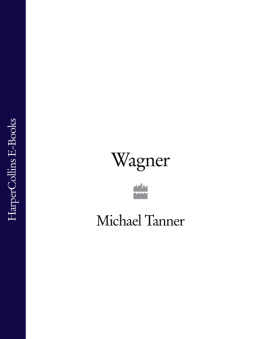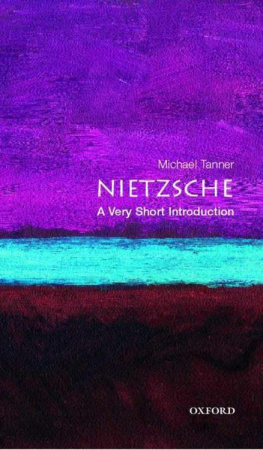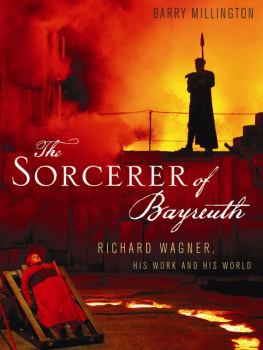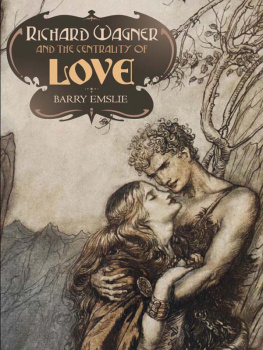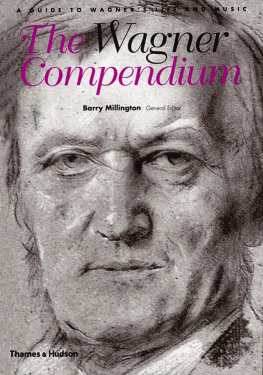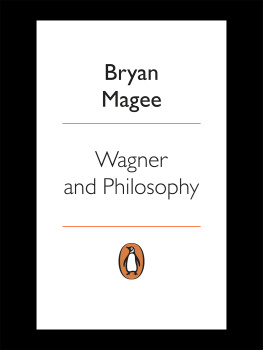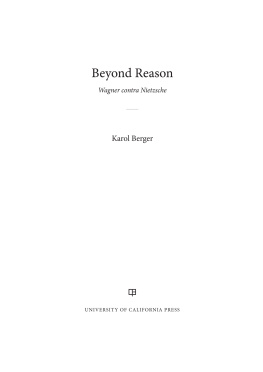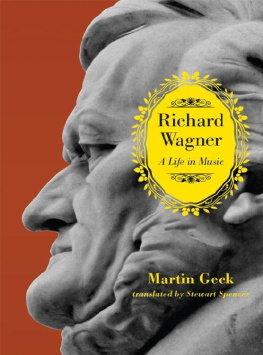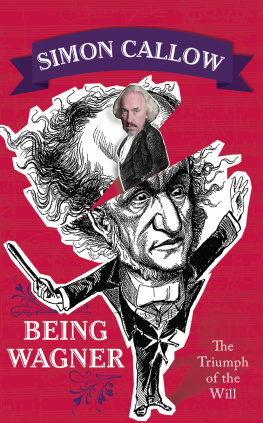For Elisabeth Furtwngler
This book is intended for people who have some, not necessarily very much, acquaintance with Wagners operas and who feel that they raise questions which are both urgent and difficult. The sensuous appeal of Wagners art is very powerful, but it also, and oddly, seems to be highly intellectual. And, as reading anything about Wagner soon reveals, it gives rise to a great deal of polemic, much of it soon taking one away from the works themselves and onto the personality that created them, and to broad cultural issues. For an artist who has been dead for more than a century, Wagners position is uniquely unstable. I want to investigate why that should be so, to put the central points in the arguments as forcefully as I can, and while not disguising the fact that I am a passionate admirer of his work, to see why so many people who are musically and culturally quite catholic in their tastes find his art repellent.
There are no musical technicalities in this book, which means that it is not an explanation of how Wagner gains his effects, but rather an exploration of what they are. Nor have I given plot summaries of the music dramas, since they are available in many books (see Select Bibliography), and in the booklets which accompany most recordings of the works.
I have discussed Wagner with countless people over a period of more than forty years. Many of those discussions have no doubt contributed to the views which I now have about his work. But the only acknowledgements which need to be made are to my friend Brian Jones, who encouraged me at a crucial stage of writing this book, and discussed its shape, and many specific points, at a length which amazed us both, but which was unquestionably beneficial. I owe him an incalculable debt; and to Frank Kermode, who asked me to write the book, and was most encouraging and patient about it. The same applies to Stuart Proffitt, who showed in extreme measure the mixture of forbearance and keenness to see the finished item which one hopes for from a publisher.
Michael Tanner
Cambridge, August 1995
1
The Case of Wagner
What is it about Richard Wagner that makes him, 112 years after his death, still so violently controversial? The easy answer would be Everything, but it would not be quite right. For no one no serious musician any longer doubts that his place among the most significant composers is now secure. That, at least, is a comparatively recent development. Until after the Second World War, which certainly did his reputation no good, and for which, to read some contemporary commentators, one might think he was in large measure responsible, there were still important figures on the musical scene who were prepared confidently to dismiss him out of hand.
But one would be hard put to it now to find that attitude. It becomes increasingly difficult to write off someone whose works remain enormously popular all over the world, whole cycles of the Ring, however outlandish the production and mediocre the musical execution, being invariably sold out in advance; and much more so now than half a century ago. Among the musical avant-garde his fate has been more complex: after a period in which many of them, Stravinsky being their leading spokesman (but even he finally recanted), regarded him as a tiresome perversion in the history of music, they have increasingly tended to find him a cause of extreme fascination, and even of inspiration. That has been especially true of the aggressive modernists of the post-World War II era, Boulez and Stockhausen. The latter is still in the process of writing a vast cycle of operas which he knows will routinely be dubbed Wagnerian, on account of their scope, ambition and pretensions. Boulez has devoted lengthy periods of an exceptionally varied and trend-setting career to conducting Wagner, and to writing about him in favourable terms, though his writings seem to urge on us the strange request that we, at long last, come to view Wagner objectively. But how can we, and how can anyone, imagine that we ever will?
We have the phrase to put someone in perspective, and we use it in an odd way. For since it has become fashionable, at any rate in philosophical circles, to use the term perspectivism, and rather less fashionable to have much of an idea of what that term might mean, people have begun to deny, on what sound like fresh grounds, the possibility of objective truth. And yet when they talk of putting Wagner, or for that matter anyone else, in perspective, they seem to mean getting an accurate idea of him as opposed to being infatuated with or violently contemptuous of him. But there is, if one understands what a perspective is, no such thing as getting someone, and a fortiori not Wagner, into it. There is only the possibility of taking various perspectives, and seeing how he looks from them. What, I think, is meant is achieving a desirable distance from Wagner, being locked in neither embrace nor combat. But what is that distance, and how would we know that we had achieved it? We are back already, too soon, at objectivity, with its connotations of lack of involvement, a capacity for seeing something Wagners works, or the whole gigantic phenomenon of works together with life together with influence of many kinds without taking sides, though we may pass judgement, of a desirably impersonal kind.
A short book which began with a long consideration of methodology might be tiresome, so I shall take as a kind of motto some sentences from Hans Kellers book Criticism:
But ever since the age of objectivity started, primarily in reaction to so-called romantic hero-worship, this new danger has, as a temptation, presented itself to the evaluating, the critical historian to canalise his own destructiveness into a professional virtue and, inspired by the spirit of detachment, find fault especially where impeccability used to reign.
In the entire history of the Western mind, one chief villain has emerged in the age of objectivity, for a variety of reasons, all of them easy to uncover RICHARD WAGNER.
(Criticism, p. 95)
That does seem undeniable, though Im not sure about the ease with which all the reasons for Wagners status can be uncovered. As Keller goes on to say, even lovers of Wagners music are often haters of Wagner the man, some of them plainly finding something exciting about the contrast in their feelings. And haters of the music often claim that it was written by the kind of person you would expect, granted what it is they hate about it. Music critics, and perhaps opera critics in particular, as we shall see, tend to be naive about the relationship between composers and their art. And even if they arent in general, when it comes to Wagner the tendency to infer objectionable features in the work from (alleged) detestable personal characteristics proves too strong to withstand, for anyone who dislikes the works in the first place.
Hans Keller goes on to offer his own diagnosis of anti-Wagnerism. But while he makes many shrewd points, it seems to me that he doesnt get to the heart of the matter. His chief claim is that we have a dread of greatness, that the age of objectivity, about which he is efficiently scathing, has supervened on an age of hero-worship, which we now view with embarrassment and distaste. While it is not uncommon to find a need to cut geniuses, especially self-conscious ones, down to size, that doesnt provide a sufficient explanation of anti-Wagnerism, since there are other geniuses whom almost everyone rejoices in celebrating. Mozart is an obvious case, even now that the myth of his childlike unawareness of his gifts has been pretty comprehensively blown. And though Beethoven is a more controversial figure, I think that that is not on account of his insistence on the respect due to his genius.

